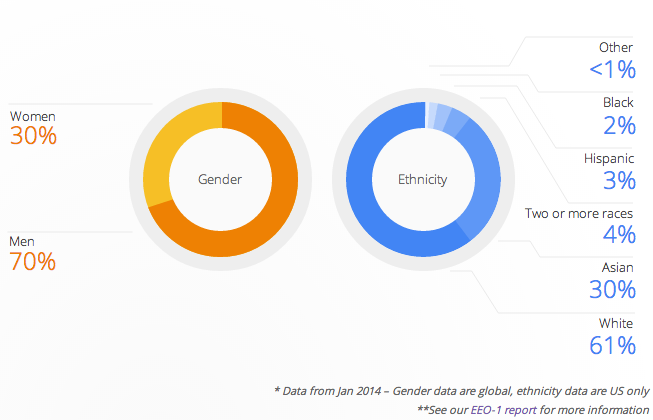Women In Tech Meet With Google Over The Gender Gap In Silicon Valley

BOSTON – Google Inc. (NASDAQ:GOOG) sought input on how to hire more female employees at an Android conference last month, days after releasing a graphic illustrating the lack of diversity at the company.
“I don't think it was a public relations stunt because they do this every year, and there wasn’t that much of a positive story to tell this time. Only 17 percent of Google employees are women. That’s not good,” said Laura Lewin, an executive editor for Pearson Technology.
Google invited female attendees of AnDevCon, a conference for Android software developers hosted by BZ Media, to a discussion where it asked for suggestions on how best to address the situation within the company and the tech industry at large, where male employees greatly outnumber females. At the conference, one session had just 12 females in attendance, or 16 percent of the overall population.
Lewin said a Google employee asked attendees about the resources available to women working in the tech industry, and what else the company could provide to improve the situation. “This was more a data-gathering mission. They were looking for ways to create better resources for developers.”
Lewin said she respected Google for hosting the event, but its transparency didn’t place it above criticism for the inequality of its talent pool. Google needs to strive harder, she said, but the issue is not confined to the search giant -- only 19 percent of computer science graduates were women in 2010.
“We have a lot of work to do earlier, in education, getting girls into STEM [science, technology, engineering and mathematics] studies more easily. We need to be reaching women at colleges, where they feel the inequality the worst,” Lewin said. “You see some classes with one woman for every 20 men.”
Lewin represents authors writing about software development and user interface, and said that while she does work with a few females writing about tech, she wishes there were more.
Joan Siebenaler, an Android developer who attended the event, said that being so outnumbered by male peers was a “daunting thing,” but her years of experience have made her more confident.
“I have been in tech so long that it doesn’t bother me anymore,” Siebenaler said. “It used to be so hard -- you were constantly surrounded by men and completely outnumbered. There were so few other women in my classes at college.”
Siebenaler said she was disappointed that her industry, so quick to advance with revolutionary updates in hardware and software, was so slow to improve in terms of gender equality.
“It’s disappointing because you expect it to get better over the years,” Siebenaler said. “You see women represented in other industries that were traditionally closed to us, like medicine and law. You see the breakdown inching towards 50 percent, but in tech, it’s not. But it’s growing.”
Jessica Liu, a product manager for a software company, said that when she was a freshman studying computer science, her class had about 30 females out of 130 students. Only 10, she says, actually graduated with computer science degrees, while the rest mostly ended up changing their majors -- or dropping out altogether.
The problem is cultural, and therefore not one that's going to be an easy fix. Liu said that when she meets another woman at her job, even she assumes that “they’re in marketing, or something not in the tech space” at first. And every time a female student or employee has a question or does not understand an issue, it reinforces the sexist presumption underlying the tech industry: that women don’t “get it.”
“There’s a general perception that women don’t understand tech, that they don’t belong,” Liu said. “That needs to change. It needs to be a more empowering environment.”
Women need to be better engaged by educators when they're studying computer science and programming, Liu said. To do that, schools need to set the bar by employing more women.
“For more women to succeed in tech, there need to be more mentors, so they understand that there are people there for you,” Liu said. “There are people that want you to succeed.”
There are a lot of young women interested in technology as a profession, Liu said, but since they are so greatly outnumbered in a “very competitive atmosphere,” it can be difficult for them to find the advice they need to learn and grow.
“There are not enough really great female mentors. I was lucky to have a few female, very few compared to the number of men, supporting me in school,” Liu said. “Someone to challenge me, engage with me, work with me. That is so important.”
© Copyright IBTimes 2024. All rights reserved.





















